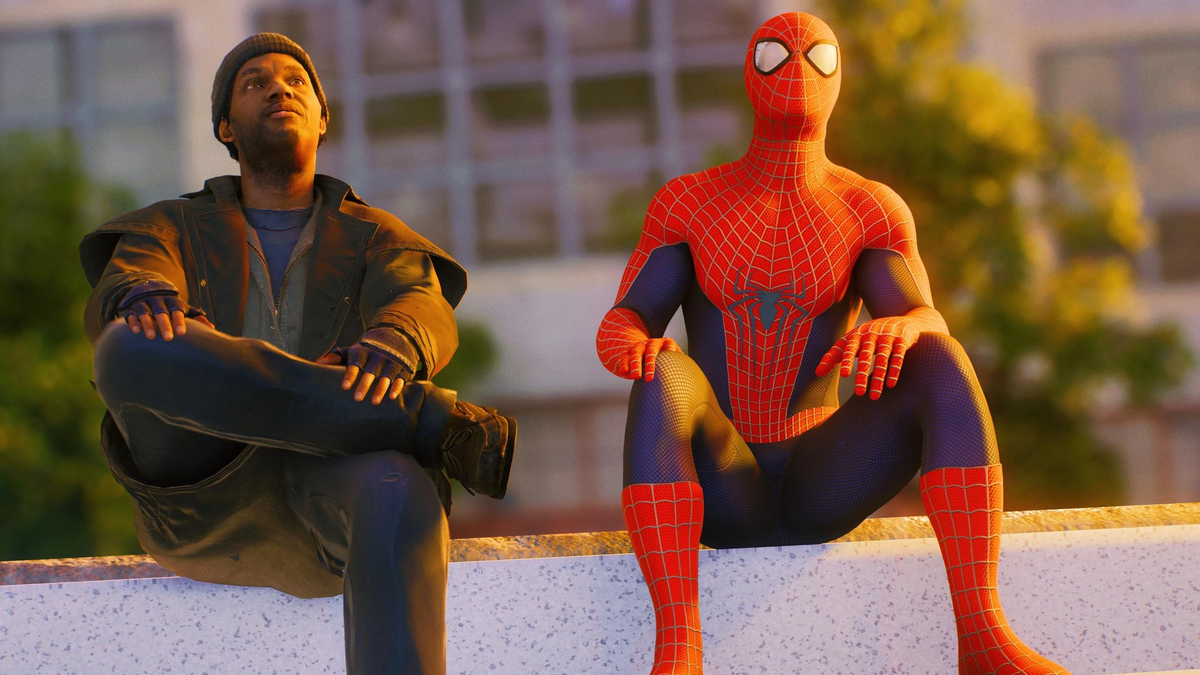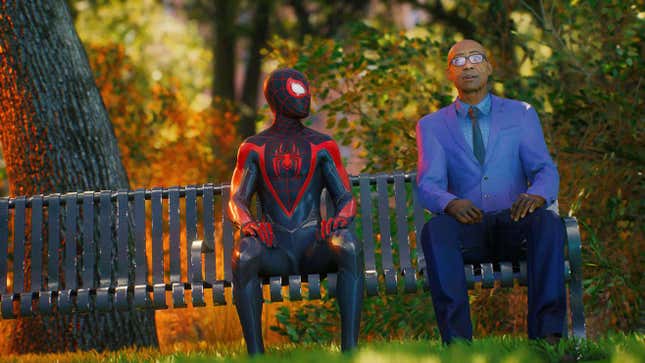
There’s a bit of a running joke in the world of Insomniac’s Spider-Man games. Avengers Tower, Bleecker Street, and Nelson and Murdock are lit up across its New York City: but when shit hits the fan, where’s everyone but Spider-Man? Perhaps the real question of these games is more of why would NYC want any other heroes looking out for them with guys like Peter Parker and Miles Morales around.
Marvel’s Spider-Man 2 is a game in which, like most sequels—especially in the world of superheroes, on top of the world of video games—the necessity of being more than its predecessor lingers larger than even a symbiote’s shadow. Not just mechanically, in that there are more things to do, more skills to unlock, more Spiders-Man to Spider-Man with; even its story reflects this, as it blossoms and twists unto a threat that doesn’t just endanger New York like the rise of the Sinister Six did in the original game, but threatens to envelop the whole world.
But for all this need to be bigger is ever-present as you play Spider-Man 2—as its story takes turn after turn for the worst, as more things to do ping all across your map—in the sea of all those things to do lie moments where the game takes a step back, catches its breath, and reminds you why Peter and Miles do all the things they do in the first place. Spider-Man 2 is at its best in these substories, these windows into the lives of not specifically Miles Morales and Peter Parker, but the lives of the people around them. Friends, community members, distant associates, complete strangers, in these moments they become, metaphorically and in some cases literally from a mechanical perspective, the protagonists of Spider-Man 2‘s story for a while.

Insomniac’s Spider-Man games have always pushed this link between the wider world and its Spider-heroes, not just narratively, but mechanically speaking as well. Every once in awhile between story setpieces across any of the three Spider-Man games, players are forced to pause the main narrative and go out into the city, do at least one piece of any kind of side content—whether it’s a full blown side mission or something as simple as finding a collectible or stopping a random crime—before Spider-Man picks himself up and prepares to carry on with whatever’s happening in the main story. To some these might feel like roadblocks, doing a chore before you get to get back to the big action and drama of the primary narrative. But over and over, these pauses are reminders: this is what Spider-Man does, not just the big hero saving the day stuff, but helping out the average New Yorker, checking on people where they can—these are as important a priority as any huge threat, and both Peter and Miles are always willing to that priority first.
Three side stories in Spider-Man 2 embody this in particular. The first literally forces the player to switch perspective, through the frame of Miles having a story recounted to him as they play as his love interest, the deaf artist Hailey. During the mission—which features a reduces soundscape and other mechanical changes to differentiate between Hailey’s interiority and that of the Spider-Men—she confronts a supposed graffiti tagger defacing the local area, only to find a similarly experimental artist to her struggling to find focus and inspiration for their work. The mission ends with the duo resolving to meet up at an art group and work more together, and with Hailey having provided a few more pieces of local wall art to the area… and Miles, just having stood there watching his friend recount this story to him. There’s no seedy stakes, no surprise criminal threat: it’s just a story of how Spider-Man inspires the people around him to be better parts of the communities they inhabit.

The other two are mechanic parallels, one where Spider-Man is asked to locate a young woman’s missing grandfather, the other where they encounter Howard—an unhoused character from the first game that keeps pigeons formerly kept by his late wife. Playable by either Peter or Miles, the two requests through the in-game “Friendly Neighborhood Spider-Man” app—built by Miles’ best friend Ganke, and part of Insomniac’s wider pushback on critiques of the first game where Spider-Man’s relationship to side content was exclusively filtered through a relationship with the NYPD—culminate with moments where control is largely taken away from the player, as they’re asked to sit and listen to two characters recounting their struggles to Spider-Man. The grandfather, Earl, recounts revisiting areas special to his now-dead wife, as he grapples with not just his increasing loneliness, but facing his own declining health, and the memories he’ll leave behind of his marriage. Howard’s plight is similarly emotional, as he tasks Spider-Man with finding a new home for his birds—as he touchingly says goodbye to a hero that supported him at his lowest, fully aware that he is in his own dying moments.
There are no villains to punch here, no spectacles to swing through. Both missions do feature some more traditionally Spider-Man-esque sequences: to find Earl, players have to navigate a series of science-y puzzle games as either Peter or Miles track his location through Prospect Park. Once Howard gives you his request to relocate his birds, you swing and soar all the way across Spider-Man 2‘s New York, from the docks of the Financial District to the suburbs of Queens, before returning to find that Howard has passed away. But they also both ask you as a player to sit in these moments, and listen to these characters share their deepest, emotional concerns with Spider-Man—a stranger in a mask, but to these people an ideal, a figure that they feel connected to. You can’t fight the fears and regrets these two men face, you can’t change their fates; they just want you to be there and listen, because you’re Spider-Man. You’re the symbol of heroism in this city, in all these different communities. And what is Spider-Man if not the hero New York and its peoples, more than any Avenger or Defender could ever be?
In these moments where Peter and Miles step back to be witnesses rather than the spotlight, we’re invited to consider what Spider-Man means as a hero to the people of New York beyond the big picture. The Spider-Men are heroes to these people, but they’re also inspirations to be better, shoulders to cry on, an ear to lend. And that’s always as important being the big superhero that saves the day.
Want more io9 news? Check out when to expect the latest Marvel, Star Wars, and Star Trek releases, what’s next for the DC Universe on film and TV, and everything you need to know about the future of Doctor Who.






